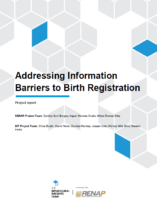Our collaboration with Registro Nacional de las Personas (RENAP) explored how behavioural insights could be applied to increase birth registration in Guatemala. Not being registered at birth presents a number of obstacles in later life, such as lack of access to healthcare, education, social programs and land ownership. Inconsistent information about the registration process is a major barrier for parents seeking to register the birth of their child. It creates unnecessary obstacles throughout the process and leads to misconceptions about the process and associated costs.
As such, our project with RENAP aimed to increase the number of birth registrations through posters with clear and consistent instructions for parents and RENAP staff about the requirements for registration. Additionally, the project aimed to reduce the number of late registrations (those occurring more than 60 days after a child’s birth).
The posters were hung in RENAP offices and health centres for six months. Emails were also sent to RENAP staff to outline the purpose and importance of the posters, and to remind officers to rely on the posters for providing information to parents.Our sample consisted of 335 birth registries across Guatemala, one within each municipality. We conducted a two-armed randomised controlled trial, with randomisation and outcome measurement at the municipality level.
We found that the posters had no effect on average birth registration rates (as measured per 100,000 population) or average timely birth registration rates over the trial period. For both outcomes there was no statistically significant difference between the control group and the treatment group, with almost identical registration rates observed across both groups.
This project highlights the importance of evaluating before implementing policy initiatives. While we did not find a significant result in this instance, we believe behavioural insights could be a valuable tool in tackling other barriers impeding birth registration. For instance, increasing the number of midwives registered with the Ministry of Health and, therefore, the proportion of midwives that are able to produce RENAP-approved ‘birth reports’.








